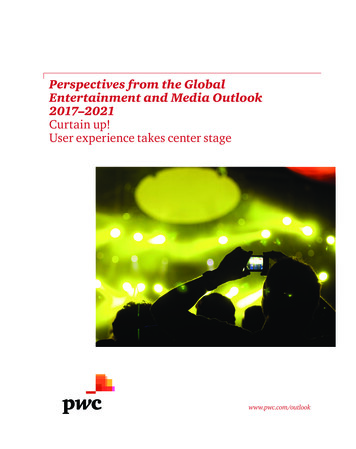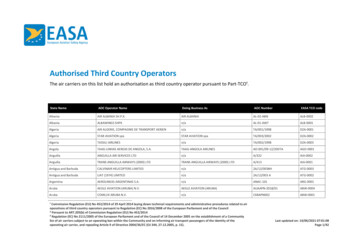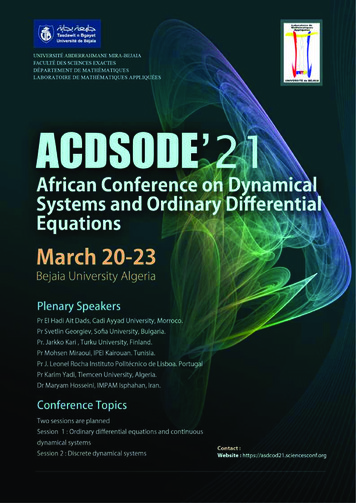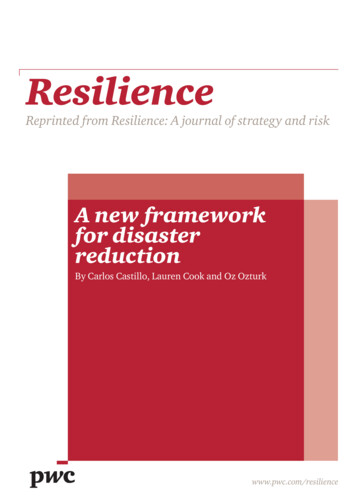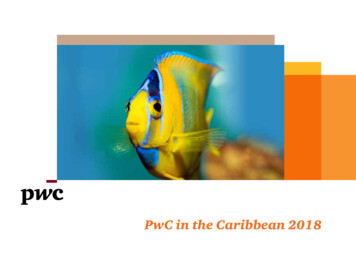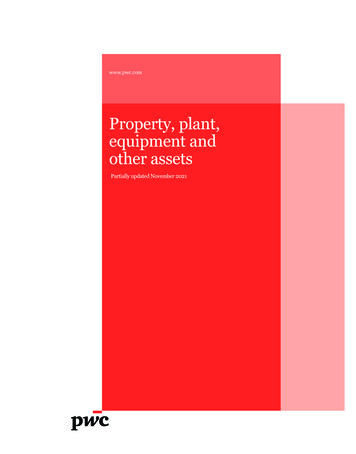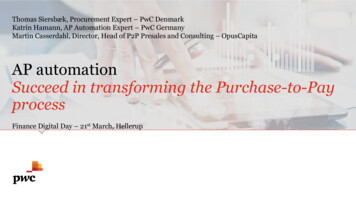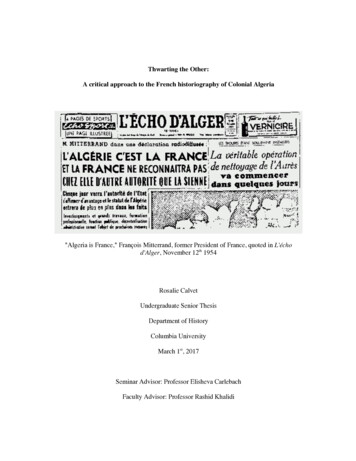
Transcription
SPORTINTERVIEWSwww.oxfordbusinessgroup.com9 781912 518234SPECIAL EDITION KIICO
CONTENTS ALGERIA 2018341 Tax liabilities: Impacts of the trend towardslower corporate tax rates on developed anddeveloping economies42 Interview: Richard Lesser, CEO, BostonConsulting Group43 Global village: Medium-term prospectssuggest globalisation is set to continue for theforeseeable future45 Interview: Ali Haddad, President, AlgerianBusiness Leaders’ ForumFINANCIAL SERVICESChanging trackPage 24The shift in macroeconomic strategy in late2017 has brought some relief to Algeria, thoughthe sustainability of this approach rests on theadoption of the necessary corrective measuresfrom 2019 onwards. Unless there is a significant and sustained increase in global oil prices to offset the impact of medium-term fiscalconsolidation, economic growth is set to slowover the coming years until the twin budgetand current account deficits are balanced.SNAPSHOT48 Mindful leadership: Fundamentals remain sound525354555761in the banking sector as the authorities move totackle new issuesInterview: Mohamed Loukal, Governor, Bank ofAlgeriaCard bargain: Despite legal changes, e-paymentsstruggle to gain footholdExtending access: Recognising the role offinancial inclusion in broader economicdevelopmentInterview: Brahim Semid, CEO, BanqueExtérieure d’AlgérieReady and willing: The bourse upgradesinfrastructure and rules while it awaits theintroduction of new listings and financialinstrumentsInterview: Lazhar Sahbani, Partner, PwC Algeria6 Algeria in briefCOUNTRY PROFILE11 Moving forward: A young population and131618192021resurgent energy sector lead to positive outlookafter several years of economic declineProductive discourse: Ongoing reforms makespace for economic recoveryInterview: President Abdelaziz BouteflikaUnified approach: Diplomatic engagement seesrising levels of foreign tradeViewpoint: Xi Jinping, President of the People’sRepublic of ChinaInterview: Ferid Belhaj, Vice-president for MENA,World BankHistoric ties: Algeria and China’s mutuallybeneficial partnership accelerates economicgrowth and infrastructure expansionMarket analysis & data provided by PwC62 Funds and gains: Private equity investmentshave a role to play in deepening and diversifyingthe economy, but some obstacles remain63 On the up: More favourable economicconditions support stronger insurance growth67 Reassuring trend: New reinsurance programmesare bolstering coverage against naturaldisasters in emerging marketsENERGY & RENEWABLES75 Encouraging outlook: An increased focus on8283ECONOMY24 Changing track: New strategy targets increasedspending and an improved investment climate31 Organic changes: Legislative reform expected to8586enhance budget planning32 Business Barometer: Algeria CEO Survey34 Interview: Abderrahmane Raouya, Minister of87Finance35 Quantitative easing: A closer look at the newmacroeconomic strategy and its impacts38 Protective measures: Import restrictions andstructural reforms target increased domesticproduction and economic sustainabilityBloomberg Terminal Research Homepage: OBGR‹GO›8889renewables is set to complement the country’slong-term commitment to fossil fuelsInterview: Abdelmoumen Ould Kaddour, CEO,SonatrachGas giant: As a viable energy alternative, gaswill become an increasingly important resourcegoing forwardInterview: Claudio Descalzi, CEO, EniInterview: Hesham Mekawi, Regional President,BP North AfricaFuelling growth: A focus on liquefied petroleumgas is central to a drive to increase domesticproductionRising tide: Solar and wind power industriesare growing thanks to ample potential anddecreasing costsInterview: Fatma Zohra Zerouati, Minister ofEnvironment and Renewable EnergyTHE REPORT Algeria 2018ISBN 978-1-912518-23-4Editor-in-Chief: Oliver CornockRegional Editor, North Africa: JaimePérez-SeoaneEditorial Manager: Charles Besse deLaromiguièreGlobal Managing Editor: Barbara JIsenbergChief Sub-Editors: Laura Nelson,Tim OwensDeputy Chief Sub-Editors: Elise Reid,Robert TerpstraWeb Editor: Fergus ScullySenior Sub-Editors: KhalifaBokhammas, Jennifer Ma, DominicMealy, Amy StapletonSub-Editors: Sheri Cavazos, CarmenCracknell, John Gray, Patrick Kurth,Kayla Moser, Alex Pichaloff, MorganSoares-Astbury, Lizzie WaymouthAnalysts: Victor Duggan, ThomasHelm, Abigail Klinkenberg, KhaledLamali, Emma SilholSenior Editorial Researcher: SusanManoğluEditorial Researchers: Jade Currie,Teresa Meoni, Beatriz Trigueros,Mengihan VefalıMiddle East Editorial Executive: BillyFitzherbertCreative Director: Yonca ErginArt Editors: Catherine Celeste, AlenaGallagher, Sara ProserpioJunior Graphic Associate: BabylynneB CruzIllustrations: Shi-ji LiangSenior Photography Editor: MouradHammamiLogistics & Administration Manager:Burçin IlgazLogistics Executive: Marly F GimenoLogistics Specialist: Rainier M Ramiro
4CONTENTS ALGERIA 2018Chairman: Michael Benson-Colpi120 Interview: Nabil Assaf, Representative, Food andDirector of Field Operations: ElizabethBoissevain121 Water works: Expanding irrigationAgriculture Organisation of the UNinfrastructure is high on the agendaManaging Director for Africa: KarineLoehmanRegional Manager for Africa: ElisePostigoCountry Director: Lamis Yazbeck122 Interview: M’hamed Metidji, CEO, Metidji Group;and President, National InterprofessionalCouncil for CerealsDirector of Field Development: HelenaAlvarez-VieitezTRANSPORT125 In the pipeline: Rail and road infrastructureField Operations: Benito B Saporna,Christian L SibayanProject Manager: Asmaa BessisProject Coordinator: Tarik DarcherifFor all editorial and advertisingenquiries, please contact us at:enquiries@oxfordbusinessgroup.com.To order a copy of this publication orto enquire about your subscription,please contact us at:booksales@oxfordbusinessgroup.com.All rights reserved. No part of thispublication may be reproduced,stored in a retrieval system ortransmitted in any form by any meanswithout the prior written permissionof Oxford Business Group.Whilst every effort has been made toensure the accuracy of the informationcontained in this book, the authorsand publisher accept no responsibilityfor any errors it may contain, or for anyloss, financial or otherwise, sustainedby any person using this publication.Updates for the information providedin this volume can be found in OxfordBusiness Group’s ‘Economic Updates’service available via email or atwww.oxfordbusinessgroup.comBloomberg TerminalResearch Homepage:OBGR‹GO›developments forge ahead129 Interview: Abdelghani Zalene, Minister of PublicEfficient expansionPage 92Algeria faces challenges in its utilities sector in terms of distribution and efficiency.While the provision of electricity is a non-issue – though sustainable generation notablyis – the rate of household connections to thenatural gas network is in need of improvement, especially outside major cities. Drinkingwater is largely secure, yet business needsare straining resources, prompting increasesin desalination and wastewater treatment.UTILITIES & WATER92 Efficient expansion: Aims include building morewater-related infrastructure and growing thenatural gas distribution network95 Interview: Mohamed Arkab, CEO, Sonelgaz97 Currents of growth: Focused investment in areaslike desalination, sanitation and irrigation haseased the stress of acute water scarcity99 Interview: Hocine Necib, Minister of WaterResourcesINDUSTRY & MINING102 Productivity boost: Industrial policy focuses onfacilitating small business creation and raisinglocal integration107 Interview: Amara Charaf-Eddine, CEO, MadarHolding108 Below the surface: New legislation aims toattract fresh mining investment and tap thecountry’s wide variety of minerals110 A steely performance: Algeria moves closer toits goal of becoming self-sufficient in steel111 Best medicine: Import replacement policy andstrong fundamentals support pharmaceuticalsexpansion112 Into high gear: Economies around the world arepreparing for the opportunities and challengesbrought about by the next industrial revolutionAGRICULTURE116 National priority: The authorities work to lowerthe food import bill and attain self-sufficiency inkey rks and Transport130 On track: Expanding rail capacity remains anational priority133 Modern travel: The authorities are lookingto ensure intermodality becomes a standardfeature of future transport projects134 Skybound: Rapid expansion of global aviationindustry propels investment effortsCONSTRUCTION & REAL ESTATE140 Scaling up: Domestic producers areincreasing output of building materials, whileinfrastructure developments are supportingexport goals145 Interview: Abdelwahid Temmar, Minister ofHousing and Urban Planning146 Sustainable urbanisation: As urban populationsundergo rapid growth around the globe,planners are striving to create efficient spaces149 Interview: Li Jian, Assistant President, ChinaState Construction Engineering Corporation(CSCEC); and Chairman, CSCEC Algeria150 Home run: The state continues its housing drive,providing support for financing and addressingthe informal marketICT156 Increased competition: Alongside digitisationefforts and strengthened cybersecurity, thearrival of new players has galvanised the localmarket160 Incubating growth: As funds are being directedto technoparks, incubators have witnessedgrowth and the flourishing of their ideas162 Interview: Steve Tzikakis, President, SAP SouthEurope, Middle East and Africa163 Expanding network: The country has witnesseda rapid increase in 4G, backed by networkexpansions that have boosted subscribershipnumbers164 Building blocks: Blockchain technology hasapplications that could revolutionise trade andprovide opportunities for the developing worldALGIERS SMART CITY168 Time for technology: Scaling the AlgiersSmart City approach may provide a model fordeveloping ICT in an effective and sustainableway across sectors
CONTENTS ALGERIA 20185170 A smarter blueprint: The new smart city ispaving the way for widespread technologicaldevelopment in other cities across the emergingworld173 Leapfrog to the lead: Project set to repositionthe country as a regional technologicalfrontrunner175 Roadmap in action: Development of the fullproject implementation model gets under wayfollowing the release of blueprint plansTOURISM179 Sights set high: Long-term development plansseek to improve international perception andsupport hotel growth185 Interview: Abdelkader Benmessaoud, Minister ofTourism and Handicrafts186 Skills and development: Hotel and tourismupgrades provide a broad range of jobopportunities from Algiers to OranProductivity boostPage 102The industrial sector is seen as having thepotential to drive economic diversificationand reduce the import bill. In addition toheavy industrial subsectors such as steeland cement, pharmaceuticals, agri-business and automotive manufacturing havethe ability to become key exporters, assistedby the country’s strategic geographic location as a gateway to both Europe and Africa.National priorityPage 116The high food import bill, a growing population and effects from climate change arebehind Algeria’s drive to increase local foodoutput. Food production improved significantly between 2007 and 2018 thanks toefforts to clear obstacles that have traditionally hindered the sector’s development,such as financing, legislation, insufficient infrastructure and land ownership.HEALTH & EDUCATION190 Committed to care: Working to meet risingdemand for medicine through increasedpartnership between the public and privatesectors194 Interview: Amine Sekhri, Country Manager,Roche Algérie195 Promoting pharmaceuticals: As health careprovision expands, demand for both local andimported pharmaceutical products is rising199 Contemporary tutelage: Transforming theeducation system to expand capacity andprepare students for the modern age204 Interview: Tahar Hadjar, Minister of HigherEducation and Scientific Research205 On the job: Development and promotionof technical and vocational training key toimproving employment ratesTAXMazars209 Terms of payment: A breakdown and analysis ofthe tax system214 Viewpoint: Samir Hadj Ali, Chartered AccountantIn the pipelinePage 125Meeting the country’s growing transportneeds remains a priority, and the nationaldevelopment plan 2015-19 allocates 6bnto upgrading, modernising and expandingair, rail, road and maritime capacity, withsignificant progress already made. Foreign investment is actively being soughtto incorporate the latest technologies andknow-how into the modernisation process.and Managing Partner, Mazars AlgeriaLEGAL FRAMEWORKGide Loyrette Nouel217 Legal landscape: A summary of the relevantlaws and regulations pertaining to investors inAlgeria222 Interview: Samy Laghouati, Partner, GideLoyrette NouelTHE GUIDE224 Luxury stays: Hotel accommodation in citiesaround the country227 Listings: Telephone directory of helpful publicand private entities228 Facts for visitors: Useful tips for new arrivalsBloomberg Terminal Research Homepage: OBGR‹GO›Scaling upPage 140Construction is a consistent engine ofgrowth, even when the overall economyslows, constituting 11.7% of GDP and employing 17.2% of the workforce in 2017. Thebuilding materials segment, which expanded by 16.3% in the first quarter of 2018, isparticularly promising as Algeria builds onrecent investment in manufacturing plantsand shifts its focus to scaling up exports.THE REPORT Algeria 2018
SNAPSHOT6Algeria in briefRecovering oil prices and a loosening of the government’s purse strings have afforded Algeria some breathing room after a number ofchallenging years. However, as Africa’s most important gas exporter, it remains highly dependent on the hydrocarbons sector for the majorityof its government revenue and almost the entirety of its exports. Despite efforts to encourage private sector development, promotediversification and attract foreign direct investment in recent years, the state still plays a preponderant role, meaning that changes togovernment expenditure and investment continue to have a significant impact on overall economic performance.Real GDP growth, 2011-20F (%)Assets of commercial banks, 2012-18 (AD 01520162017 Mar-18Source: IMFSource: Bank of AlgeriaOil indicators, 2007-17 (000 bpd)Natural gas production, 2007-17 (bn cu 50007020072008 2009201020112012 201320142015 20162017Source: BP650708091011121314151617Source: BPTravel & tourism’s contribution to GDP by segment, 2017 : 9
SNAPSHOT7Container traffic at the Port of Algiers, 2012-17 000Source: Port of AlgiersIndividuals using the internet, 2007-17 (%)Government budget for agriculture,2015-19 (AD urce: ITUSource: MoFBuilding sector GDP*, 2012-17 (AD bn)Tertiary enrolment by gender, 2011-16 (% of 12201320142015Source: ONS20162017*current pricesIndustry value added growth, 2015-18 (% change)7201120122013201420152016Source: World BankElectricity consumption, 2013-17 3Q4Q1Q22015 2015 2016 2016 2016 2016 2017 2017 2017 2017 2018 2018Source: ONSBloomberg Terminal Research Homepage: OBGR‹GO›0102030Source: MoETHE REPORT Algeria 20184050607080
9Country ProfileThree-quarters of residents live in urban centresYoung and growing population offers high potentialOil and gas remains a major contributor to GDPAuthorities signal upcoming structural reforms
COUNTRY PROFILE AT A GLANCEApproximately 76% of the country’s residents live in urban centresMoving forwardA young population and resurgent energy sector lead to positiveoutlook after several years of economic declineAlgeria’s population reached 42.3m by the end of 2018,making it the second-largest country in North Africaafter Egypt, which surpassed 100m earlier in the year.With demographic growth of 1.7% in 2017, Algeria’sMinistry of Health expects that the population willreach 51m by 2030. The population remains relativelyyoung, with a median age of 27.8 and 29.2% of residentsunder the age of 15. Life expectancy at birth continuesto rise, reaching 76 years in 2016.In line with global trends, recent decades have seenAlgeria become increasingly urban, with approximately76% of residents living in urban centres in 2018. However, the population is highly decentralised, and onlyabout 5.4m live in the metropolitan area of Algiers,the capital. The western port of Oran is the country’ssecond-largest city, with an estimated population ofroughly 650,000, and in the north-east Constantineranks third with around 500,000. Altogether, the country has 40 cities with populations of around 100,000.GEOGRAPHY: At 2.4m sq km, Algeria has the largestland mass of any country in Africa or the Mediterranean. Located in the French-speaking Maghreb regionof North Africa, it boasts a Mediterranean coastline ofmore than 1200 km, with 6734 km of land borderingseven countries and territories: Libya, Mali, Mauritania,Morocco, Niger, Tunisia and the Western Sahara.The country is divided into 48 administrative provinces, known as wilayas, and 1541 municipalities, orbaladiyahs. The largest wilaya by land mass is Tamanrasset in the south, with a sparsely populated areaof 556 sq km, but the largest according to populationremains the Algiers metropolitan area.Algeria can be broadly divided into three topographical regions: the Tell, a narrow coastal strip north of theTellian Atlas mountains; the Hauts Plateaux, betweenthe Tellian Atlas and Saharan Atlas mountain ranges;and the desert region to the south of the Saharan Atlasrange, which accounts for 80% of the country’s territory. Characterised by hilly and mountainous terrain,Bloomberg Terminal Research Homepage: OBGR‹GO›Algeria’s average elevation is 800 metres and morethan half of the country is at least 900 metres abovesea level. The highest point is Mount Tahat, standing at2908 metres in the Hoggar range of the Sahara region.The north of the country lies at the boundary ofthe African and Eurasian tectonic plates, and thus isseismologically active. In 1980 and 2003 major earthquakes struck the country, each individually killing andwounding at least 2000 people.The northern coastal region is relatively fertile andreceives up to 1000 mm of rain in some areas, andbenefits from year-round rivers descending from thenearby Tellian Atlas mountains. Due to erratic rainfall,rivers in other regions do not have water year-round,and none of the country’s rivers are navigable. Furthersouth, the steppes become increasingly arid, givingway to the Sahara Desert beyond the Atlas Mountains.While the southern desert regions have large intraday variations in temperature and can be hot all yearround, coastal areas can be classified as Mediterranean. The majority of the population lives in theseareas, where summers are hot and dry, while wintersare relatively cool and wet. The central Hauts Plateauxhave a similar climate, though they experience less andfar more irregular rainfall overall.Average temperatures in Algiers, range from 22 Cto 29 C in August, the hottest month of the year, to aslow as 9 C to 15 C in January.LANGUAGE, RELIGION & ETHNICITY: More than 90%of Algerians identify as Berber, descended from theindigenous pre-Islamic populations of North Africa.Considering the strong influence of Arab culture following the 7th and 8th century conquests, most Berbersalso officially identify as Arab.Despite centuries of Arabisation, more than a quarter of the population still speaks Berber as their firstlanguage, and many identify primarily as Berber. WhileBerbers are spread throughout the country, they areconcentrated in the north-east region. There are aboutTHE REPORT Algeria 201811
12COUNTRY PROFILE AT A GLANCEAlgeria’s population reached 42.3m by the end of 2018, making it the second-largest country in North Africa100,000 Protestant Christians as well as 2000 peopleof Jewish faith living in Algeria, and around 99% of thepopulation identifies as Islamic. Islam is recognised bythe constitution as the state religion, though the lawenshrines the right to freedom of worship.Algerian Arabic is derived from dialects originatingin the north of the country and is spoken as a firstlanguage by around 73% of the population. However,Modern Standard Arabic, a more formal version ofthe language, was established in the country’s 1963constitution as the first official language.Nearly all of the remaining 27% speak Tamazight,an indigenous Berber language, which was formallyrecognised as a national language by way of a constitutional amendment in 2016, having been suppressedfor decades. By virtue of the country’s colonial heritage,French is also widely spoken in government, media andschools, and particularly among urban elites.NATURAL RESOURCES: Algeria is one of the leadingAfrican producers of hydrocarbons, ranking first in gasproduction and among the top-three oil producers.According to the Organisation of the Petroleum Exporting Countries (OPEC), of which the country has beena member since 1969, Algeria has proven oil reservesof 12.2bn barrels and proven gas reserves of 4.5trn cumetres, the third and second largest on the continent.Although not yet commercially exploited, the country has large reserves of shale oil and gas, and ranksthird globally behind China and Argentina in termsof technically recoverable shale gas reserves. At thesame time, much of the country’s territory is eitherunder-explored or unexplored, and offshore exploration has remained limited.Domestic consumption of oil and gas has doubledsince 2010, while production has continued to stagnate,which has resulted in declining volumes of hydrocarbons exports. When combined with the sharp fall inglobal prices that occurred in 2014, this has continuedto weigh on both exports and government aIn addition to hydrocarbons, Algeria also has notable reserves of high-grade minerals. The country hasthe third-largest reserves of phosphates in the world,and has significant proven deposits of iron ore, gold,zinc, copper and uranium. Many of these deposits areunder-exploited or under-explored due to their location in the more isolated and mountainous southernregions of the country, areas which frequently haveunderdeveloped transport infrastructure links.ECONOMY: Algeria’s GDP is anticipated to reach 188bn by the end of 2018, which will make it thelargest economy in the Maghreb region and secondlargest in North Africa after Egypt. Its per capita GDP,anticipated to reach 4500 by the end of 2018, indicates that it has the highest living standards in theMaghreb. Tunisia and Morocco follow with per capitaGDPs of 3573 and 3355, respectively.Neighbouring Libya has experienced a strong recovery, with its per capita GDP reaching 6639 and surpassing Algeria’s. Due to the size of its population,Egypt has the largest economy in the region, but itexperiences the lowest living standards, with its 2018per capita GDP predicted to come in at 2572. Measured on a purchasing power parity basis, Algeria boaststhe highest GDP per capita in the region by virtue ofits lower price of basic purchasable goods.The state continues to play a dominant role in theAlgerian economy, depending on oil and gas exports forsome 60% of public revenue and 96% of exports. Thesharp decline in global oil prices since 2014 resultedin several challenging years for the Algerian economy.However, until 2016 its relatively low debt-to-GDP ratioand significant savings in its hydrocarbons stabilisationfund allowed the government to maintain high fiscaldeficits, and thereby cushion the negative impact itmight have on economic growth.Fiscal consolidation in 2017 caused growth todiminish to 1.4% that year, down from 3.2% in 2016,accompanied by a corresponding increase in overalllevels of unemployment. Facing the challenges of thiseconomic downturn, in late 2017 the authorities madechanges to economic policy, and in 2018 they financedgovernment spending by way of monetary financingthrough the central bank. While this is expected toboost economic growth in the short term, with theIMF forecasting GDP growth of 2.5% for 2018, it risksan eventual increase in inflation.When the authorities do take action to rein in thebudget deficit, economic growth is expected to slowsignificantly. At the same time, the imposition of importrestrictions on 851 consumer products has donelittle to impede the current account deficit or slowthe decline in international reserves thus far, raisingchances of more difficult corrections in future years.The authorities have signalled their intention tointroduce a wide range of structural reforms aimedat diversifying the economy, promoting the privatesector and gradually leading the country away from itsestablished dependence on hydrocarbons. A number ofactions have been taken to achieve these goals since2015, with new initiatives also to be launched in 2019.
COUNTRY PROFILE OVERVIEW13There are 462 elected members in the National People’s AssemblyProductive discourseOngoing reforms make space for economic recoveryUnder its constitution, which was last amended in2016, Algeria is a semi-presidential republic, witha president acting as head of state and a primeminister acting as head of government. Electedfor a five-year term, the president is empowered toappoint the prime minister and a council of ministers, following consultation with the parliamentarymajority. While within this structure executive powerlies formally with the government, in practice themost significant power is centred around the headof state, who also sits as commander-in-chief ofthe armed forces. The current president, AbdelazizBouteflika, has served four terms since coming tooffice in April 1999. The two-term limit was abolished via constitutional amendment in 2008, butreinstituted in 2016 in such a manner as to allowthe incumbent to run for a fifth term in the nextelection, which is scheduled for April 2019.By late 2018 a consensus was beginning to emergethat President Bouteflika would run for, and likelywin, his fifth consecutive term.PARLIAMENT: Legislative power is shared betweenthe executive and the two chambers of Parliament,namely the National People’s Assembly (AssembléePopulaire Nationale, APN), or lower house, and thenational council, or upper house. The 462 membersof the APN are directly elected to serve five-yearterms under a proportional representation system ofmulti-seat constituencies, with eight seats reservedfor Algerians living abroad. The last assembly election took place in May 2017. The president appointsa third of the members of the national council, withthe other two-thirds elected for six-year terms, andhalf of that number elected for three-year intervals.At a local level, the country is divided into 48administrative divisions, known as wilayas, each ofwhich are governed by a regional governor, or wali,appointed by the president. The legal system is amixture of French civil law and Islamic law, with anBloomberg Terminal Research Homepage: OBGR‹GO›Constitutional Council consisting of public officialsand Supreme Court judges charged with the judicialreview of legislative measures.The 150-member Supreme Court is the highestjudicial body in the country, structured around eightfunctional chambers. Supreme Court judges areappointed for lifelong terms by the High Council ofMagistracy, which is presided over by the president.Despite the influence of Islamic law on the Algerian legal system, there are no sharia courts currently operating in the country.HISTORY: Algeria was under Ottoman rule forover three centuries until being colonised by theFrench in 1830, and did not achieve independenceuntil 1962. This was after a long and bloody war ofliberation in which more than 1m Algerians wereestimated to have been killed.Unlike neighbouring Tunisia and Morocco, whichwere governed as protectorates, the north of Algeria was incorporated into metropolitan France, withrepresentatives in its national assembly. French citizenship, however, was not automatic, and remaineddifficult to obtain. The country’s interior was completely under French control, although it was notincorporated into the French state itself.The key player in the independence movementwas the National Liberation Front (Front LibérationNationale, FLN), which would go on to constitutethe dominant political party in the post-colonialperiod, first as ruler of a one-party state, and lateras the largest in a multi-party democracy. In practice,however, since achieving independence, politicalpower in the country has remained concentratedin the hands of a small community of politicians,military figures and, more recently, businessmen.Ahmed Ben Bella, one of the FLN leaders duringthe struggle for liberation, became the first president of newly independent Algeria. He pursuedsocialist economic policies and an independentTHE REPORT Algeria 2018In the National People’sAssembly there are8seats reserved forAlgerians living abroad
14COUNTRY PROFILE OVERVIEWThe nation is undergoing numerous reforms to diversify the economy and stimulate domestic productionSocial unrest in October1988 gave rise to anew constitution whichremoved the militaryfrom its central role ingovernment, relaxedrestrictions on the mediaand allowed for theestablishment of additionalpolitical parties.foreign policy as part of the Non-Aligned Movementuntil being deposed in 1965 by Houari Boumediene,chief of staff of the armed for
Bloomberg Terminal Research Homepage: OBGR‹GO› THE REPORT Algeria 2018 The high food import bill, a growing popu-lation and effects from climate change are behind Algeria's drive to increase local food output. Food production improved signif-icantly between 2007 and 2018 thanks to efforts to clear obstacles that have tradi-


